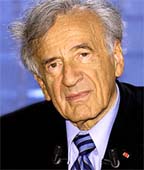NEW YORK, (Reuters) – Calling accused swindler Bernard Madoff a “crook, a thief, a scoundrel,” Holocaust survivor and Nobel Peace Prize winner Elie Wiesel said yesterday he could never forgive the man he says stole all of his foundation’s money.
Wiesel said he twice met Madoff, a once-respected Wall Street trader who authorities say preyed on the Jewish elite of North America and Europe in what grew to be an estimated $50 billion fraud. They discussed ethics and education, not finances.
“Could I forgive him? No,” Wiesel said during a discussion, “Madoff and the Meltdown,” hosted by Conde Nast Portfolio magazine. “First of all, it would mean he would come on his knees and ask for forgiveness. He wouldn’t do that.”
He said the Elie Wiesel Foundation for Humanity had $15.2 million under management with Bernard L. Madoff Investment Securities, substantially all of its assets. Wiesel said he and his wife also lost personal investments, but he did not disclose the amount.
Madoff, 70, is under house arrest in his luxury Manhattan apartment after being arrested and charged with securities fraud in December. He has not appeared in court to formally answer the charge as several government agencies investigate.
Asked about so-called affinity frauds and whether Madoff’s being Jewish had any relevance, Wiesel said Madoff “is simply a crook, a thief, a scoundrel. It is not the Jewishness in him, it is the inhumanity in this man.
“What he has done to people breaks my heart.”
Charitable foundations serving the poor and needy, universities, hospitals and thousands of individual investors have said they were victims of Madoff’s Ponzi scheme, one in which early investors are paid off with the money of new clients.
Wiesel, who survived Nazi Germany’s concentration camps in World War II and won the Nobel Peace Prize in 1986, said he was introduced to Madoff through a friend. He said the unidentified friend lost $50 million in the purported fraud.
The 80-year-old Wiesel, on a panel with former U.S. Securities and Exchange Commission chairman Harvey Pitt and veteran short seller James Chanos, suggested a government bailout for the charities.

